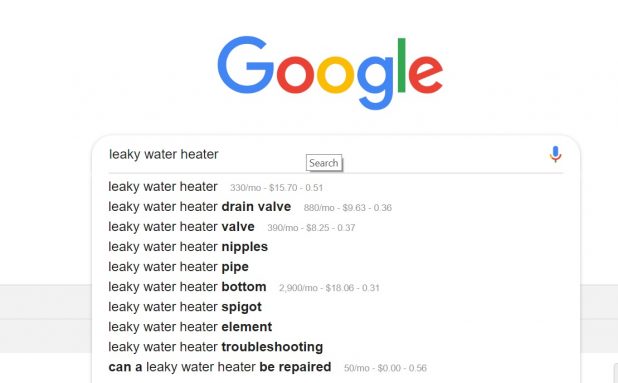Keyword research is the first and most important step in any SEO endeavor. This is why, when most people hear “keyword research” they automatically think about SEO.
And they aren’t wrong.
But keyword research can help you with more than SEO. When you do it right, you get unparalleled insights into your customers’ needs, wants and intent. You can use it as the bedrock of all your marketing tactics.
When you unlock your customers’ intent, you have everything you need to create new products and services or improve existing ones. User intent is that magic key that opens countless doors: popularity, traffic, financial success and amazing ROI.
But let’s take it one step at a time.
Let’s take a closer look at how you can nail the keyword research for your small business.
This is the process that the SEO writers at Idunn, the digital marketing agency I run, use to come up with the right keywords that rank our clients’ content high in SERPs.
Step 1: Make a list, check it twice
Yes, take a page from Santa’s book.
If this is your first take at keyword research for your small business, you have to start with a broad list. Gather up your team (they don’t all have to be marketers) and brainstorm words and phrases that people might be looking for in order to get to you.
It can be as broad as your main product. For instance: running shoes or wedding cakes. Don’t worry – this is not your final list, you’re just beginning.
The key to this process is to forget you are the business owner or marketer. Go back to your buyer persona and put yourself in their shoes: what would they search for?
Think about the most frequent questions clients ask you. What do they want to know? Consider both prospects and current customers.
Step 2: Get outside help
The problem with doing this in-house is that, no matter how hard you try to see things from your customers’ perspective, the chance of slipping into your old business owner or marketing mind frame is high.
So you have to take a look at what the “hive mind” thinks about your field.
Luckily, you have several options here:
1. Social media
Turn the main keywords you have on your broad list into hashtags. Find out what people are talking about. More importantly, find the questions they are looking for. The answers to these questions are your next blog topics.
Social media is also a great place to find trends and forecasts related to your field. Things get announced or discussed on Twitter or Facebook faster than in newspapers or blogs.
2. Forums and boards
You will find a handful of forums and boards for every industry. And you’ll find them easily.
Simply search for: “keyword + forum” or “keyword + board”.
Again, take a look at the questions people are asking. Can you provide more detailed or better answers than they already got? Great! Start writing!
3. Related searches and auto-suggest
Take the broad terms from your brainstorming session and type them into the search bar. Pay attention to autosuggest.
These are the terms that are associated with your search by most users. You can either use them as standalone keywords or sprinkle them in a post where you have another foundational keyword (more on that later).
Next, press enter and scroll down to the bottom of the page. The “related searches” section is another goldmine.
Step 3: Divide and conquer
Now that you have quite a few search terms on your list, it’s time to bring back the star: user intent.
This will help you divide your list into two major categories: foundational keywords and intent-oriented keywords.
Foundational keywords, as the name suggests, are those keywords that are inherently related to your field of activity. They may even be your field of activity. New York lawyer, plumbers, digital marketing agency – these are a few examples of foundational keywords.
Keep in mind that ranking for such terms is VERY hard, sometimes even impossible. And, more importantly, that they may only bring in traffic and not sales.
Consequently, you have to be prepared to invest a lot of time, money and content into them. You will not rank for a short, competitive keyword overnight.
Why invest in them then?
Because of latent intent.
You want to be a go-to hub for people searching for information related to your industry. To put it bluntly: you want to catch them early.
Moz and HubSpot are excellent examples of companies who do this. They both rank for short keywords related to their industry (online marketing). They make their money by selling products, but even those who aren’t their clients know their reputation and have read their articles. When those people will be in the market for a CRM, for example, HubSpot will be the first name on their mind.
Topic clusters are a great way to rank for these foundational keywords.
For a topic cluster to rank, its structure is of the utmost importance. One of the tricks we use at Idunn to make sure we get that right (aside from various tools and related search) is…Wikipedia.
The screenshot below depicts part of the Wikipedia table of contents for “social media”. I have to be honest, I would have never thought about including some of them in a topic cluster that exhaustively covers social media.

Intent-oriented keywords are typically long-tail keywords that are far easier to rank for. Better yet, they are more lucrative.
Since they depict intent, when you rank for one of them you attract customers that are at the bottom of the sales funnel. In other words: customers that are ready to buy.
The examples above are a good place to start. If your foundational keywords are covered (or if you decided to skip them altogether – a perfectly valid choice for a small business), here’s how you can turn them into intent-oriented keywords:
New York lawyer → New York lawyer free consultation
Plumbers → fix my heater OR plumbers for hire in Halifax
Digital marketing agency → affordable digital marketing agency OR affordable + location + one of the services your agency offers
I think you got the point. User intent is the fastest, sometimes the easiest way to monetize your SEO efforts.
BUT this doesn’t mean your entire SEO strategy should be focused on this. Your first and foremost concern should always be writing great content that brings actual value to your readers and potential customers.
The two examples I gave above illustrate this point. Moz and HubSpot wouldn’t have had the success they have today without delivering content that kept their customers coming back.
Keyword research tools my agency uses
There are hundreds of tools that claim to revolutionize your SEO game. But you shouldn’t pay a fortune to subscribe to every one of them.
This is why this list contains mostly free tools:
1. Google search
I detailed above. The plain, old Google search is a goldmine that a lot of people overlook.
2. Google Ads platform
Yes, the Google Ads (formerly AdWords) platform is for paid ads. But this doesn’t stop you from getting keyword suggestions from it.
However, I recommend double checking this with another tool.
3. KeywordTool.io
This is a free tool that generates long-tail keywords. You can use KeywordTool to generate long-tail keywords. Also, you can use it as inspiration for intent-oriented keywords
4. LSI keywords tools
I wrote an article for SiteProNews detailing why LSI keywords matter and why you should incorporate them in your SEO strategy. You can check the article here, along with tools recommendations.
5. SEMrush or Ahrefs
Having tested both, I can assure you that both are great choices if you want to up your SEO game. They both have a lot of features that allow for in-depth keyword research, along with competitor monitoring and more.
Neither of them is free, though. In SEMrush, you have access to a few features with a free account. And Ahrefs offers a 7-day trial for $7.
Final recommendations
You should never write SEO content just for the sake of writing or ranking. Writing with purpose starts with proper keyword research. Take your time with this and make sure that the keywords you select match your marketing strategy and your business goals.
If you need help with keyword research and SEO content writing, my team and I are just a click away. Check out our copywriting and content writing services and let’s talk!
Adriana Tica is an expert marketer and copywriter, with 10 years in the field, most of which were spent marketing tech companies. She is the CEO of Idunn, a digital marketing agency that helps clients all over the world with copywriting, social media marketing and marketing strategy. Follow her blog here: http://idunn.pro/blog.
The post The Ultimate Guide to Keyword Research for a Small Business + Tools to Use appeared first on SiteProNews.


